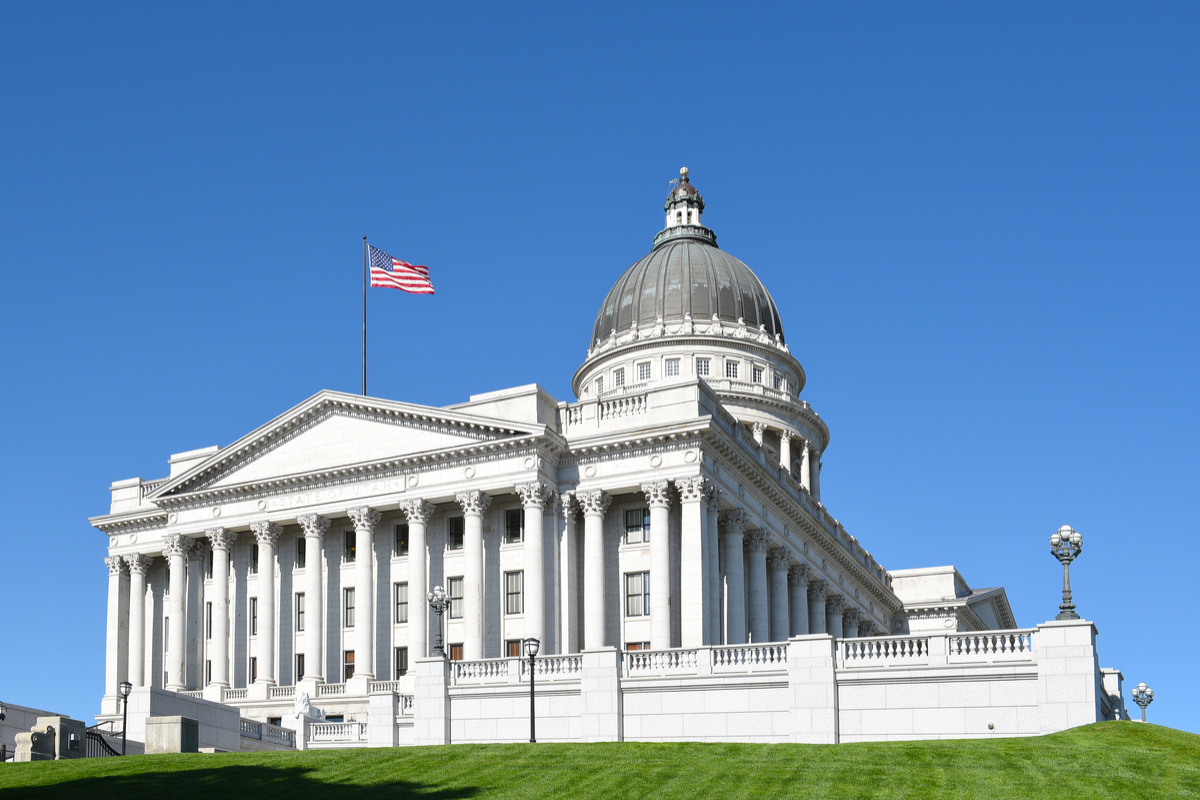Volcker Alliance Updates Its State Budget Report Cards

The Pennsylvania State Capitol in Harrisburg Shutterstock
A new detailed breakdown of the state-by-state ratings and additional insights aim to help state budget practitioners “understand and improve their state's critical fiscal practices.”
The time is ripe for state budget shenanigans. The time always seems ripe for some kind of state budget shenanigans.
“Illinois continues to do nothing to address its pension pit,” said Bill Glasgall, director of the state and local program at the Volcker Alliance, the nonpartisan New York City-based government research and watchdog organization named after board member and former Federal Reserve Chairman Paul Volcker. “Jersey sold the state lottery to its pension fund and improved accounting, but there’s only one state lottery to sell. Pennsylvania is borrowing against a big tobacco settlement, but it will pay interest on that money just to fill a short-term hole.”
Glasgall was speaking to Route Fifty Tuesday ahead of the release of an updated version of the multi-year 50-state budget analysis it unveiled in November. The update, made available to the public Wednesday, includes an interactive map of the states and state by state report cards fine-tuned through analysis of additional information. The hope is that new detailed breakdown of the state ratings and additional insights will help state budget practitioners “understand and improve their state's critical fiscal practices.”
The project looks at numbers from fiscal years 2015 through 2017 and gives grades in Budget Forecasting (estimating revenues and expenditure), Budget Maneuvers (using one-time actions to balance budgets), Legacy Costs (funding public employee retirement and benefits), Reserve Funds (overseeing and using rainy day funds), and Transparency (disclosing budget-related information).
Glasgall said that uncertainty in the wake of the recently passed federal tax overhaul and the continuing slow recovery in the wake of the Great Recession has meant that many states will be adjusting and re-adjusting basic budgets for some time. Some states will do that work transparently, according to a long-term vision and following sound budget practices. Others states, not so much.
To paint with a very broad brush, California, Hawaii, Idaho and Utah did well, earning straight As in three of the five categories graded. Alabama, Illinois, Kansas and New Jersey struggled, drawing on average the most D or D-minus grades.

But the Volcker Alliance project isn’t painting with a very broad brush; it doesn’t aim to compile lists of leaders and losers. The authors of the project—organization staffers working with more than 50 professors and graduate students in public finance and budgeting programs at 11 universities—acknowledge that state budget systems are complicated in ways that make direct comparisons misleading. They’re also well aware that it takes more than best practices in budgeting to make state programs operate effectively on the ground, where qualities like long-term vision, good faith political will and skilled management make all the difference.
For those reasons, the grade reports taken together read more like a health study, where smoking may cost one of the subjects a lot of fitness points, but it won’t necessarily mean that same subject isn’t among the most fit of the group.

“Look at Utah,” Glasgall said. “They had a pension crisis some time ago but they responded. Texas enjoys a Triple-A credit rating, but it still doesn’t make the full contribution to its pensions.
“You have other states—New Jersey, Kansas, Illinois—that just have a hard time getting out of their own way, overspending and under-taxing for so long that they’ve really dug themselves some holes.
“This is just a way to monitor state governments,” Glasgall said.
Indeed, the report authors make a strong case for the project. On one hand, government budgeting is often arcane and best practices are far from universally acknowledged, much less accepted. On the other hand, states and localities spend more than $3.4 trillion a year, according to the report, an amount “equivalent to more than a fifth of the entire U.S. gross domestic product,” and it’s money that pays for education, health care, and public safety programs coast to coast—programs “basic to our well-being as a nation,” as the authors put it. “The purposes and manner in which public funds are spent… all demand our attention.”
In times like the present when there is need to reduce and reallocate funds, “the potential to defer or obfuscate in making adjustments is very real,” the report warns. “That is why the need for comprehensive and accurate accounting and transparent reporting of the financial positions of individual states is even more compelling.”
Glasgall said one of the areas crying out for improvement is keeping track of tax expenditures. He said budget writers need regularly published and complete accounts that include how much revenue states are giving away in exemptions, corporate subsidies, and investment credits, for example. “Georgia, Vermont and New Jersey provide really detailed reports. Utah barely scratches the surface,” he said. “Even legislators don’t know the true state of revenue losses.”
Among the categories graded, state legislatures as a whole still struggle most to address Legacy Costs, or how they manage their pension funds. Taken together, the 50 states earn a “C” grade in that category.
Glasgall said bad practices tend to persist.

“New York uses a million one-time actions and it always will. There isn’t a budget trick New Jersey hasn’t found. Illinois is hard even to evaluate because they didn’t actually have a budget in place for years.”
Glasgall said the audience for the report cards included budget and fiscal experts, legislators, investors and individuals. “We all pay taxes,” he said. “We’re a constituency!”
He said some lawmakers have responded to the report cards by introducing legislation to improve their state’s practices.
In Pennsylvania, Republican state Rep. Seth Grove in December introduced House Bill 2026, which would set up a new Revenue Forecasting Committee in the state. Grove told Route Fifty that there was too much “fudge factor” built into the budget every year. He said estimates come in after spending levels are set and often are simply adjusted to make the budget work.
“People say this is how things have always been done. Well, I always cast a skeptical eye on the way things have always been done.”
He noted that the fiscal year 2016 forecasting was off by $1.5 billion.
“Change isn’t easy, but I think we can make it better by being more transparent and open and making those forecasts more reliable.”
The organization’s next round of report cards is due in October. Here are some of main takeaways from the current report ...

Straight Shooters
California and Alaska rated top grades three years running in transparency because they do what so many of the other states don’t do: They come clean on the costs for necessary infrastructure upgrades and replacements that they were kicking down the road. “There’s no reporting standard on this and it can become a really big hole to fill,” Glasgall said. “California issues five-year transportation costs.”

Players
Overall, states are getting better about not using what the report refers to as “maneuvers” to fudge spending reductions by making one-time or temporary fixes or leaning on accounting tricks that move numbers around, such as “using up-front cash flows at the time of bond refinancing and making transfers into the general fund from special funds to pay for recurring expenditures,” in the language of the report cards. “It’s a tribute to the states and evidence of the state of the economy that about 20 states did really well in that regard. The ones that didn’t do so well in that regard include New Jersey, which managed D grades all three fiscal years, and Illinois and New York, which both managed to trend down from mostly Ds, receiving D-minuses in 2017.

Laggards
Glasgall said large legacy cost liabilities are often a “problem that defies solution.” He quoted California Gov. Jerry Brown, who speaks of a “wall of debt” that keeps the state from investing as much as it could in major public service areas such as education and transportation. Notable laggards in the category include Colorado, Illinois, Kentucky and New Jersey.
Working off data collected by The Pew Charitable Trusts, the Volcker Alliance reports that Colorado budget writers, constrained in part by low-tax constitutional amendments, have managed to amass only 60 percent of what the state owes its retired workers. Illinois, which has failed to pass any budget at all in the last three years, has managed to set aside only 40 percent of what it owes its employees. And New Jersey lies hand in hand with Kentucky at the bottom of the heap, both storing away a mere 38 percent of what they owe their retired workers. As the Volcker Alliance reported, New Jersey carries an unfunded pension liability of $135.7 billion, second only to California’s $174.1 billion among all the states.
Note: At the other end of the spectrum, Idaho, Oregon and Utah received A grades in managing their legacy costs. Oregon and Idaho have funded 92 percent of their pension obligations, and Utah has funded 86 percent of its obligations.
John Tomasic is a journalist based in Seattle.
NEXT STORY: What Does the Economic Forecast Look Like for U.S. Metro Areas?





